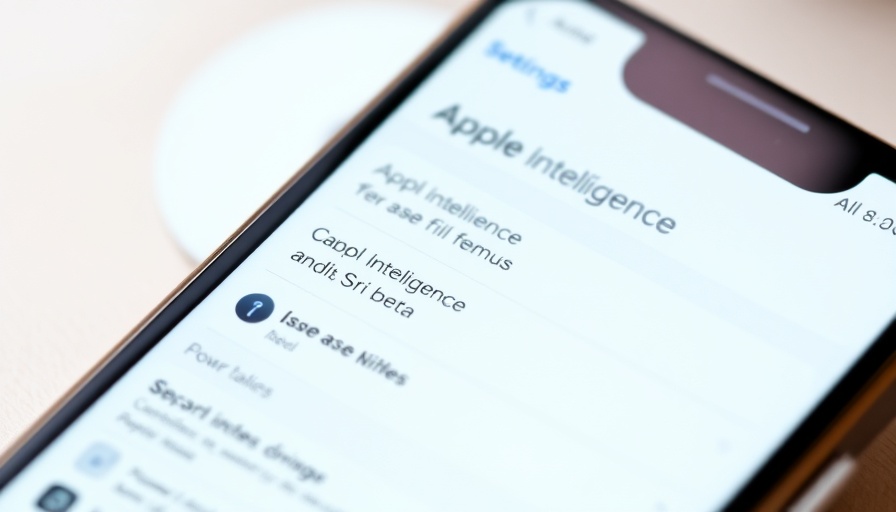
Apple's AI Journey: Where We Stand
As we approach WWDC 2025, Apple finds itself at a crucial juncture in its journey through the rapidly evolving landscape of artificial intelligence. The introduction of Apple Intelligence last year sparked a flurry of excitement, as the tech giant revealed plans for an enhanced Siri and AI features designed to assist users in more personal and intuitive ways. However, nearly a year later, skepticism is mounting as promised features remain absent, raising questions about Apple’s commitment to staying competitive in this dynamic sector.
Limited Progress: User Frustrations
Despite the rollout of some handy features like Genmoji and voice memo transcriptions, many users are left craving more actionable improvements. Apple's A18 chip does indeed open up possibilities for on-device processing — a crucial aspect for maintaining user privacy. Still, the bulk of Apple Intelligence's functionalities remain under wraps, leading to disappointment among a user base eager for more robust capabilities.
Three Upgrades That Could Turn the Tide
In light of these challenges, there's potential for Apple to earn back the faith of its discerning users. Here are three upgrades that could redefine Apple Intelligence:
1. Revamping Siri: A Need for a Serious Upgrade
Although Siri received a visual makeover, functionality continues to lag behind competitors like Google Assistant and Amazon Alexa. Users desire a voice assistant that can offer quick, reliable feedback on a broad horizon of queries while displaying genuine conversational capabilities. It’s apparent that Apple's development should pivot towards enhancing Siri’s knowledge base and its capacity to perform a wider array of tasks independently of third-party tools like ChatGPT.
2. Embracing Agentic AI: Letting Technology Work For You
Agentic AI has emerged as a revolutionary trend, aiming to create systems that can take proactive actions on behalf of users. Rather than merely responding to commands, Apple should solidify its stance by embedding this tech deeply within its suite. Users could benefit from features that autonomously manage tasks like scheduling or data organization, effectively transforming AI from a reactive tool to an intelligent agent that anticipates needs.
3. Context-Aware Personalization: Beyond Basic Functionality
The ability of AI to understand and leverage user context is becoming increasingly vital. Apple must prioritize developing systems that learn from daily interactions, thereby enhancing the relevance and timeliness of its responses. A personalized assistant that can anticipate reminders, suggest travel routes based on calendar inputs, or even prompt users to check emails at the most suitable times would greatly improve interaction quality.
Future Predictions: Apple and the AI Landscape
The stakes are high as Apple’s current standing in AI remains uncertain. Maintaining user loyalty amidst stiff competition necessitates a commitment to actionable upgrades. If Apple successfully launches the aforementioned features, it could not only salvage its reputation but also reshape user experiences in unprecedented ways, particularly for professionals in tech and marketing.
Actionable Insights for Executives
Understanding the evolution of AI technology is crucial for business professionals. As Apple exploits new capabilities, it’s a reminder that organizations should also align their strategies towards leveraging AI. Staying informed about such advancements can facilitate innovation in marketing efforts and enhance operational efficiencies.
In conclusion, as the tech world eagerly awaits productive developments from Apple, users and professionals alike are encouraged to engage with the unfolding narrative of AI. Upgrades that focus on usability and intelligence will not only help reestablish Apple’s position but will also pave the way for a future where AI seamlessly integrates into daily workflows.
 Add Row
Add Row  Add
Add 




 Add Row
Add Row  Add
Add 

Write A Comment